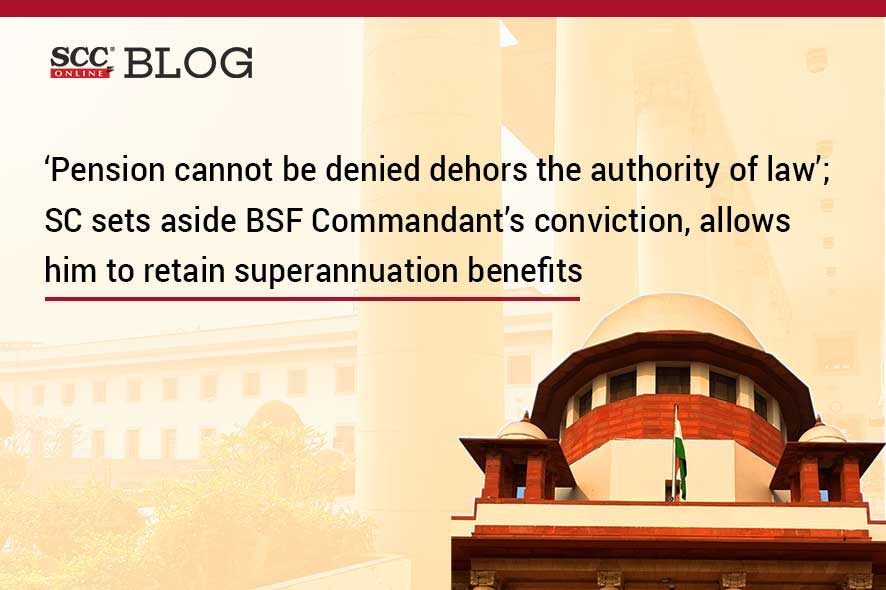Supreme Court: In a criminal appeal against the order of Punjab and Haryana High Court wherein, the appellant’s petition to quash his trial and consequential orders to release the pensionary and other benefits was dismissed, the Division-Judge Bench of Krishna Murari and Ahsanuddin Amanullah*, JJ., allowed the appellant’s appeal and set aside his conviction order and allowed the appellant to retain the pension benefits.
Brief Facts
In the matter at hand, the appellant joined the Indian Army as an Assistant Commandant in the Border Security Force (‘BSF’). Thereafter, he was promoted as Commandant, he was also awarded various medals, including the Police Medal by the President of India for rendering about 30 years of unblemished service. Later, he was transferred to Punjab as Commandant of the 1956 Battalion. On 05.04.1995, the local police conducted a search and a few Jerrycans of Acetic Anhydride, a controlled substance under Section 9-A of the Narcotic Drugs and Psychotropic Substances Act, 1985 (‘NDPS Act’) were stated to be in Pakistani territory and in the fields owned by Indian civilians adjoining the border. On 07.04.1995, the appellant was directed to hand over charge and was placed under arrest. Search of appellant’s house did not lead to any recovery of any incriminating materials.
On 09-04-1995, an inquiry was ordered into the incident and the Inspector controlling the area where Jerrycans were recovered made a statement against the appellant alleging that he was involved in the incident. Thereafter, the appellant was superannuated on 31.08.1995, and a charge-sheet was served to the appellant for offences under Sections 40 and 46 of Border Security Force Act, 1968 (‘BSF Act’) and Section 25 of NDPS Act. The General Security Force Court (‘GSFC’) found the appellant guilty and sentenced him to 10 years of rigorous imprisonment; imposed fine of Rs. 1,00,000/- and dismissed him from service. Aggrieved by the order, the appellant filed a petition before the High Court for quashing his trial and the impugned order therein, as also seeking directions to quash all consequential orders and to release the pensionary and other benefits to the appellant. The appellant was granted bail, but the High Court dismissed the appellant’s plea to release his benefits, which forms part of the impugned judgment.
Court’s Analysis
The Court analyzed the proportionality of the appellant’s punishment considering his nearly 32 years of service to the Country and viewed that the punishment meted out was disproportionate. The Court said that in the absence of direct and cogent evidence against the appellant, even if the GSFC was convinced of the appellant’s guilt, the punishment handed out was too harsh, knowing appellant was a first-time delinquent, and not a habitual offender. The Court noted that the appellant had served the country for over 31 ½ years without blame or blemish, and received various awards, including medal from Hon’ble the President of India, the appellant’s track record was unquestionable.
The Court said that it should not be construed that the appellant, being the Commandant, had no duty to prevent such incident, but to stretch it to the extent to label him an active partner and facilitator of such crime was wholly unjustified since no direct evidence was found against the appellant, further. Further, the Inspector’s statement, who confessed his involvement in the crime and added that it was on behest of the appellant’s direction cannot be enough to incriminate the appellant solely without other evidentiary materials. Therefore, non-recovery of any incriminating evidence from the appellant’s house must benefit the appellant.
The Court viewed that considering the seriousness of the issue, the High Court was not denuded of the power to sift through the evidence, further it reiterated that High Courts, under Articles 226 and/or 227, are to exercise their discretion solely by the dictates of judicial conscience enriched by judicial experience and practical wisdom of the Judge, as highlighted in Surya Dev Rai v. Ram Chander Rai, (2003) 6 SCC 675.
Placing its reliance on D.S. Nakara v. Union of India, (1983) 1 SCC 305, the Court reiterated that a person cannot be deprived of pension dehors the authority of law.
Thus, the Court allowed the appeal, quashed the impugned judgment of the High Court and set aside the conviction and sentence of the appellant awarded by the GSFC. It was held that appellant was entitled to full retiral benefits from the date of his superannuation.
[B.S Hari Commandant v. Union of India, 2023 SCC OnLine SC 413, Judgment dated: 13-04-2023]
Judgment Authored by: Justice Ahsanuddin Amanullah






